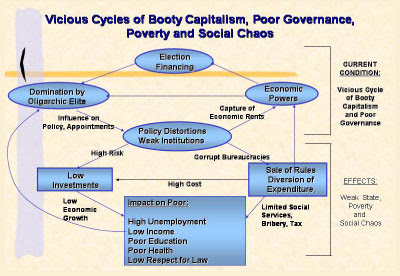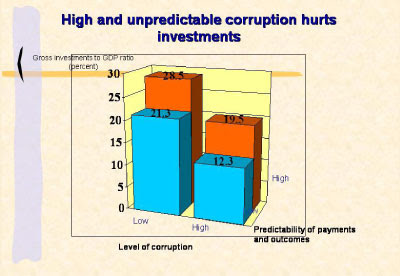Posted by: Alecks P. Pabico | February 19, 2008 at 4:50 pm
Filed under: The Economy, Governance, In the News
CALL it pragmatism, plain naïveté or a total cop-out, but former socioeconomic planning secretary Romulo Neri thinks the reforms in the country’s political economy that he has been advocating since he joined government service in 1990 would be better led by no less than Gloria Macapagal-Arroyo herself.
“The reason I have stuck it out with the Cabinet is because I feel there is hope within the Executive,” declared Neri at a hastily organized press conference in Malacañang yesterday. “I cannot see hope coming from a coup d’état. I cannot see hope from any Church-led type of movement…I cannot see it coming from Senate investigations alone. I cannot see it coming from the Black and White [Movement] and civil society alone.”
“To me, the President will have to lead in this whole reform process,” he stressed.
Neri was at the press conference, along with Executive Secretary Eduardo Ermita, to deny what his friend and the Senate’s key witness in its ongoing investigation on the scrapped national broadband network (NBN) deal, Rodolfo Noel ‘Jun’ Lozada Jr., reluctantly revealed to senators yesterday — that he had referred to Arroyo as “evil” during a supposedly confidential meeting he had with opposition legislators Panfilo Lacson and Jamby Madrigal in December last year.
That meeting, claimed Neri, had little to do with the $329-million NBN project with the Chinese firm, ZTE Corporation, as it was more a discussion on the nature of the political economy and the whole oligarchic structure of the Philippine state.
“I gave my usual lecture on political economy and, to shorten it, I just put one brief framework. And I think we all agreed that this is the nature of the Philippine state and the oligarchic state,” he explained. Neri added that it was similar to the lectures he used to give to legislators and Cabinet officials when he was still head of the Congressional Planning and Budget Office of the House of Representatives.
In such lectures, Neri often referred to the Philippine state as a “booty capitalist state,” a term derived from “booty capitalism” which was popularized by American scholar, Dr. Paul Hutchcroft. Such a state, Neri said, is dominated by powerful business groups who finance electoral exercises and use politicians and the machinery of government to further their economic interests. In effect, they “use the powers of the State to enrich themselves at the expense of everybody.”
Describing the vicious cycle of booty capitalism, Neri wrote: “When their candidates win, the vested interest groups are able to add political power to their already vast economic power. This oligarchic elite is able to influence policies to the point of distorting them. And their very ability to distort policies allows them to capture economic rent, economic rent being extraordinary profits which make them extraordinarily rich. This gives them greater economic power which in turn allows them to finance our election.”
For the political economy to be reformed, Neri advocated no less than a change in the system characterized by the “domination by the oligarchic state (influencing policy and political appointments), which results in policy distortions and weak institutions.”
“Unless the system is changed, it will continue to have negative impact on the poor,” he said, as evidenced by a “weak state, poverty and social chaos, giving birth to high unemployment, low income, poor education, poor health, and low respect for law.”
But judging from his pronouncements yesterday, critics are saying that the reformist in Neri may have already been compromised, as he now prefers to “sleep with the enemy.”
For Tet Gambito of Maritime Watchkeeper, Neri’s apparent change of heart was already evident in his Senate testimony on the NBN deal last year, after he acknowledged his “hidden agenda” in going along with the project despite being contrary to conditions set out by Arroyo in a board meeting of the National Economic and Development Authority in November 2006 — that it be a “pay for use” facility undertaken via a build-operate-transfer (BOT) mode, and with no government subsidies.
This, Gambito said, has shown that Neri has been “merely and simply mouthing some academic mumbo jumbo, or cowed out of his professed stand that booty capitalism is doing the country much harm. Faced with a situation where he could have brought down the whole cabal of ‘booty capitalists’, he turned his tail and ran!”
REFORMING THE POLITICAL ECONOMY
According to Dr. Paul Hutchcroft, a scholar from Yale University who wrote his doctoral thesis on the political economy of the Philippines, “Booty Capitalism” exists where the state is dominated by powerful business groups who finance electoral exercises and use politicians and the machinery of government to further their economic interests. The vicious cycle of booty capitalism starts when vested interests including powerful business groups, finance their own candidates during elections. When their candidates win, the vested interest groups are able to add political power to their already vast economic power. This oligarchic elite is able to influence policies to the point of distorting them. And their very ability to distort policies allows them to capture economic rent, economic rent being extraordinary profits which make them extraordinarily rich. This gives them greater economic power which in turn allows them to finance our election.
The impact of policy distortions and having weak state institutions make it very risky for investors to come and invest in the country. And if you have low investments, you have low economic growth. The impact on the poor is high unemployment, poor income, poor education, poor health, and low respect for law. On the State side, if there is a corrupt bureaucracy because of weak state institutions, the sale of rules occurs as well as the diversion of expenditures to graft and corruption. Social services are therefore limited and the bribery tax to the poor is very high. The cost of doing business here also becomes very high.
Political economists, both local and international, have blamed our lack of economic and social progress on the Philippine political and economic elite that fostered restrictive trade, fiscal and exchange rate policies. These policies entrenched oligarchic families while impoverishing the rest of the country. These policies favored capital over labor and import-substituting industries over agriculture, and led to underinvestment in the human capital of the poor.
Dr. Paul Hutchcroft’s Matrix
Dr. Paul Hutchcroft said that a state is either a rational-legal state or a predatory state. A rational-legal state makes rules for the good of everybody, while in a predatory state, those in power make rules to enrich themselves.
We have a rational-legal state, as in the case of a Laissez Faire Regulatory State (Quadrant 1). Supposedly, the best condition is the laissez-faire regulatory state where business is greater than the state but where rules and regulations are enacted and enforced for the good of everyone. Laissez faire means to let business do its thing, but with very good regulations.
Another rational-legal state is the Developmental State (Quadrant II) where, on the other hand, the state is greater than business. An example of this is Singapore where the government is involved in a lot of activities, and also Japan, Korea and Taiwan in their early stages.
Among the Predatory States, one can have a Bureaucratic Capitalist State (Quadrant III) where bureaucrats are very powerful and enrich themselves at the expense of everybody. Or one can have the Philippines — an Oligarchic or Booty Capitalist State (Quadrant IV) where it is the oligarchs who determine policies — who in effect use the powers of the State to enrich themselves at the expense of everybody.
Now investors would like to invest in a Bureaucratic Capitalist State rather than a Booty Capitalist State because the former at least would be able to deliver and has enough powers to do so. In the latter, even if you bribed a bureaucrat, it would be very, very costly to do so, and you may still not get what you want if there was someone you had forgotten to deal with, or if an oligarch decides to get involved and so on.
Countries with good economic policies
A World Bank study shows that in countries with weak state capability and poor economic policies, income per capita grew by only 0.4 percent. In contrast, income per capita in countries with high state capability and good economic policies grew by 3.0 percent. These differences in income growth have made a huge difference to the quality of people’s lives.
Index of Bureaucratic Capability
The effectiveness of a state is in part dependent on the capability of its bureaucracy. Good policies will go to naught if the institutions that will implement them have very low capabilities. A highly capable bureaucracy can contribute so much in policy formulation and can promote growth and poverty reduction through efficient delivery of services.
A World Bank study has determined that the Philippine government has become the largest employer in the country. In terms of bureaucratic capability, however, the Philippines lags behind its Asian neighbors. While the average index of bureaucratic capability in East Asia is 0.6, the country’s index is at 0.2.
Depth of Political Appointments
Political intervention in the recruitment process, which is based mainly on connections rather then on merit, has further aggravated the situation. This is visible in a review of the depth of political appointments where the Philippines has more political appointees in its bureaucracy compared to other East Asian nations.
High and unpredictable corruption
Another study has showed that it is both the risk and high level of corruption that really deters investors. When corruption levels are low and predictability of payments and outcomes is high, there results a high liquidity ratio of gross investments to GDP — but if the level of corruption is high, the predictability is low even if you paid — then the ratio is significantly lower. This explains the Philippines’ low ratio.
Good government helps explain the income gap
The importance of having strong and capable state institutions can not be ignored in promoting economic development. It can be clearly seen in the experience of countries in Sub-Saharan Africa and East Asia as reported by the World Bank. In the 1960s, personal incomes in East Asia were only slightly higher compared to those in Sub-Saharan Africa.
In the mid-1990s, however, the difference in incomes between the two regions had increased.
The World Bank report pointed out that the difference could be explained by the good economic policies adopted by the East Asian states and the effectiveness in the implementation of these policies. Another reason is that government consumption in the Sub-Saharan states grew to one-and-a-half times compared to East Asia. This experience shows that good policies and strong and capable state institutions to implement them produce much faster economic development.
Strengthening State Institutions
Strengthening our state institutions is necessary for greater economic development. Discouraging TROs and judicial intervention in business decisions is important because investors will shy away from countries where the judiciary system is unpredictable. Moreover, a sound judiciary is essential to a properly functioning market economy. Meanwhile, giving a higher pay to judges will help reduce the risk of corruption.
Strengthening the political party system entails, among others, allowing for State financing for political parties. This will help ease “money politics” and minimize the influence of interest groups — and increasingly, of drug gambling syndicates — on public policy.
The limiting of political appointments and the establishment of a credible merit system for appointments and promotions are requirements for a strong bureaucracy. We urgently need to insulate the administrative service from political influence and to enhance its accountability, transparency and efficiency

Tuesday, February 19, 2008
Reforming The Political Economy According To Neri
Subscribe to:
Post Comments (Atom)

0 comments:
Post a Comment